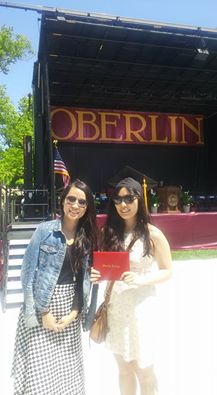|
You're at the tail end of the undergraduate application process - the testing, the interviews, the essays are all behind you now. Whew - congrats on completing an intense process. And, if you're reading this article, my guess is that you also have choices ahead of you. Wonderful.
So, which college/university? I've compiled a few tactics to thoughtfully review the choices at hand.
Best of luck on your decisions!
0 Comments
What does it mean?
Well, congratulations! It might feel like another rejection, but what the wait list means is that you're one of the applicants that the university finds qualified to be part of the community - just that there wasn't enough space for everyone. Due to the competitiveness of many colleges and universities, it means that there were several students just as qualified as you, and perhaps there was something else that someone else had that the admissions officers found would contribute to the mix of this particular class. Typically the difference between accepted students and those that are wait listed are arbitrary and minor. Pat yourself on the back for this accomplishment. What to do next? If you'd like to be on the wait list, you must actively notify the university. Follow the instructions included in the notice/letter and be sure to respond. There are several things to do and not do to better your chances of getting off the wait list. However, many competitive universities only accept small percentages of students off their wait lists, so be sure to put down a deposit at a school in which you'd be happy to go to otherwise. Most schools accept students off the wait list after the May 1 decisions requirements of those that were accepted before pulling from the wait list. Things to keep in mind:
Best of luck on school decisions! Nervousness and anxiety when it comes to standardized testing is pretty common - so, you're not alone. The anxiety or fear is actually a sign that your body is ready to focus on the task ahead, all that remains is how your harness that energy. Here are some tactics to keep cool and calm so that you perform your best on test day.
Months/weeks leading to the test:
Day of:
 I can't believe how much university/college tuition has risen over the last few decades! If you're a senior that has decided (back on May 1) which college you'll be attending, you might be overwhelmed about how to fill the gaps that you likely have in your financial aid package. After all those essays from the admissions process, you're likely to want to take a break from anymore writing or submission of applications - but don't! Applying to scholarships is actually worth your while as there are many students that do sit back and relax and don't even bother to apply. This ups your odds of getting some aid. And, many of the times, you won't need to submit a personal statement. And very likely, you'll find that you can recycle a lot of the work that was completed back in the fall! LOCAL SCHOLARSHIPS We highly advocate for prioritizing application to local scholarships. There are many of them, while at a lower gift, you're more likely to actually receive the award. There are a few places in which you can search for all types of scholarships, specifically for local scholarships...
ONLINE SEARCH You can find both national, regional, and local scholarships online. Our favorite websites for the search are:
Again, if you don't apply, you won't get anything! And lots of smaller scholarships can make a significant dent in tuition costs. So, while we aren't telling you to avoid the big, prestigious scholarships, we do encourage you to apply to many of the opportunities that may have smaller awards that have less competition and better your odds of securing funds. Best of luck on the scholarship search and application process! It's the end of summer, the weather's getting cooler and it's also college application time. We recently came across this very brief article on how Jessica Yeager, a graduate of Harvard and MIT, managed to get offers from 7 Ivies! Read more here.
Our take on this : Start early, dream big and do your research. The last point is we at Lucent Education feel that we can make the biggest difference. It's good and well to be able to get information off websites and YouTube videos, but nothing beats getting advise from people who have actually been there and have experience helping others get there too! Have a look at what our clients say about us! As always, drop us a message or visit our Facebook page for more info!  With summer well and truly underway, we hope that you are using these warm and lazy days productively! Pokemon Go might be getting everyone off their couches and into the streets, but a little more effort productivity-wise goes a long way! NPR Ed recently posted a piece on how high school students need more than just college-prep. Employers are increasingly expecting college graduates to possess some measure of competency at jobs, be it punctuality, customer-service or professionalism. It was suggested that any summer job, including ones that may seem 'pointless' or 'dead-end', might actually make students a lot more competitive out of college. So there. We think it's definitely time to don those aprons and learn a few new skills - be it latte art or flipping burgers! Even better, go experience the work environment of a career you've never thought of being in. If jobs are hard to come by, volunteer to offer your time. There are few employers who would say no to bubbly enthusiasm and an extra pair of hands! If there are any industries that you might be interested in and are looking for an introduction, do drop us and e-mail!  My younger sister, there's a large age gap, just graduated from Oberlin. It was her absolute first choice school - turning down other exceptional institutions to be there. She was considering pursuing music - and Oberlin Conservatory is one of the top in the nation, if not the world. During graduation weekend, this stood out. The spirit of the school is very performance oriented - from the O!Circus to steel drums to taiko - there was a performance every afternoon during graduation/alumni weekend, somewhere on campus. I really enjoyed hearing the senior recitals at Finney Chapel - the musicians are quite talented! Oberlin's known for being quite liberal - and that showed. From man buns to an all-sex system for bathroom usage in dormitories, the school definitely inspires a tree hugger type feeling that you get when walking across the better known UC Berkeley (Cal). But, there's a more casual feel to the culture as compared to schools like BU, Tufts, Middlebury, Amherst. It's similar to how ballet dancers, perfect and tidy during performances, wearing gritty, ripped clothing during practice. Perhaps in the perfection of performance, Obies (as they call themselves) turn to a grittier, more laid back version of themselves as they walk through campus. The school is composed of 2 schools - liberal arts & conservatory. I do believe that the conservatory's culture spills over into the rest of the school's culture. The tour guide even said that although she was a violinist, her goals weren't to pursue music in college, but wanted to be around performance (and she will be minoring in dance). However, from conversations with students and actions of the students at graduation - there is a clear differentiation of the two programs. As there were only about 700 graduates total, each name was announced. The conservatory was first - and not too long after the completion of the dual degree students, the conservatory students began to leave their seats. Ok - 3 hour long graduation, I'd be tempted, too! But, if one of my best friends was in the liberal arts college - I'd stay put and get ready to cheer for him/her. This was telling for me. Not in a negative way, but to share with prospective students that the two are separate entities and with as much muddling there is between them, there is still a clear divide between conservatory and liberal arts students. It all makes sense - you'd be spending a lot more time in classes with those in the same school. Overall, Oberlin has an excellent academic reputation. Some of the newer buildings are LEED certified, the spaces are beautiful, the campus inviting. For the right student, what an awesome undergraduate experience! I would heavily consider the liberal arts school if you fit into the following categories:
Your life is filled with lots of accomplishments, events, and memories. So, there's a huge urge to want to share all of that in your college application essay. With between 500 and 750 words to work with, it's impossible to get all the wonderful things you've accomplished and want to share with the admissions officer into this one essay, at least not in any sort of meaningful way. So, resist that urge to list a bunch of events! There are multiple parts to your application - the resume, your grades, short essays, standardized testing, and recommendations. All of these components will contribute to giving the admissions offer a rich picture of who you are.
Let the resume tell your chronological accomplishments from work, volunteer, and extra curricular activities. Let recommendations brag about the more qualitative pieces of who you are - personality, drive, etc. And, let the essay tell the reader how you think, your aspirations, and where those aspirations come from. In most cases, this stems from a story or series of events that are pivotal in your life. Here are some questions that might help you pinpoint these types of events:
Once you settle on the topic, don't forget to expand on the story and why it's significant, how it's changed who you are/your goals, and how it ties to your aspirations for the future or your more immediate next steps. After reading thousands of college application essays from students at all different levels of writing, I've learned that the most powerful essays are ones that are genuine. For whatever reason, the right words flow, the thoughts are better conveyed, and the essay never feels forced or over-edited. It's a win-win for the prospective student: it's easier to write the essay & it's a more memorable essay for the reader, too.
We can tell when a portion of the essay feels forced - when a student starts writing what they think should be written instead of their own thoughts and perspective on their life and future. Or a parent interferes and suggests what they believe an admissions officer would like to read. Big ideas and strategy for the essay can come from many different places (parents, peers, other mentor figures), but we find that something wonderful always emerges when the student finally gets to writing their own thoughts down. It's always a transformative process, guiding students through this new type of writing - about themselves, their thoughts and desires for the future. Regardless of writing skill level - a genuine essay is one of the ingredients that is most powerful. Most families know that every component of the college admissions process is important. Families know the importance of grades, challenging coursework completed, and the cumulative GPA. Many students also take test prep courses or get private tutoring for SATs and ACTs. But what about the admissions essay? Is it just another essay – similar to the assignments at school?
The essay is the one component of the application that can really set a student apart from the pack. With selective schools, for every enrollment slot, there are 5 students with the same scores, GPA, and extracurricular leadership stats. The essay is the only real opportunity to set yourself apart from the others once you hit your senior year – the grades, coursework, and typically test taking is already completed. Your words paint a picture of your past, how you think about your future, and what you’ve learned from your experiences thus far. It paints a picture for the admissions officer – who you are, where you can contribute to the school, and what you can bring to the campus that isn’t already there. Often time, it’s what gets a student into a reach school – when all else equal, the essay is what tips the scales in an invitation to enroll at a school. Okay, so we know it’s really important. It’s important, and also a skill that hasn’t been honed by most 16-18 year olds that are looking to attend college. The admissions essay isn’t a book report, analysis of a concept, or summary of a historical period. It’s partially a marketing essay and partially a personal thought essay – both of which aren’t studied much in high school. If a student regularly writes their personal thoughts about life and daily ongoings into a diary – that is likely the best practice they are getting for this type of essay. However, these journal entries aren’t likely getting proofed for structure and effectiveness in getting a point across to the reader. So… a few tips on the essay writing process:
Of course, Lucent Education helps students through this process – it’s our specialty. We take the mystery out of it, helping students hone in on the skills to write these types of essays through one on one support; "on the job" type support with revisions, questions, and conversation. We never compromise the authenticity of the writer's words and our goal is to help students find their voice in the essays so that they come across genuine, individual, and thoughtful. Just as it takes many hours to learn how to put together a great book report, we structure an effective plan to help applicants learn while completing their admissions essays. I often get the question from parents: What should we do to make sure my child can get into the best possible college? Well, when that question is asked when the student is in 10th grade, it’s a bit too late! A good time to think a bit more in depth about your child’s college prospects is in middle school. Think about how you’d plan for a new project at work – you don’t just dive into a project without completing a bit of brainstorming and perhaps more thorough strategic planning. It is no different in the college applications process. Here are a few things to consider:
I chose Purdue over University of Southern California. It wasn’t because Purdue is renowned for its engineering, but because California doesn’t snow. Coming from a tropical country, I yearned for a complete winter experience. But do I regret going to Purdue? Despite my lack of real research and snow or no snow decision making process – the answer is a clear cut no. Purdue has shaped me to the person I am today, one that I am proud to be.
Purdue is a great school to study engineering, which is a common thought about Purdue. But it wasn’t until I went through Purdue’s engineering program that I came to realization what that actually meant. The first year was a “filtering” process where I was able to witness many students who were unable to cope with the rigorous curriculum, switch majors. But it was through this selection system that I got the most out of Purdue’s engineering program. Because of this “filtering,” all the students that go on to be your closest peers are smart and hardworking, making academic life competitive, rigorous, and rewarding. At Purdue, opportunities to grow, succeed and learn are plenty. Purdue hosts the largest college career fair on campus in the United States, with many dream companies such as Microsoft, Google and Apple coming to recruit talented students every year. But it was the excellent service provided by Purdue’s career center that made all the difference – they helped me land a job in the States despite being an international student. The people that I’ve met while being at Purdue constantly inspire and challenge me to grow personally and professionally. Through my involvement with the Society of Asian Scientists and Engineers (SASE) at Purdue, I was given the opportunity to personally talk to and learn from many top company executives, including the Vice President of P&G and Chief Counselor of BAE Systems, a chance that many wouldn’t have during their undergraduate experience. Their unceasing aid to student organizations allows us to have those great minds as our speakers during events. Luck was on my side as it turns out that Purdue is a great fit for me – despite my snow or no snow decisions process. -Gary Khoo, Lucent Education I applied to colleges thinking I knew what I wanted to do – become a pediatric dentist while completing a major related to science or engineering. That didn’t happen. But, I was given the freedom (without judgement – actually, with lots of encouragement) to find my real passions. I transferred from the Engineering school to the College of Arts and Sciences. Switched majors, then added a 2nd major. Coming from a family of engineers and doctors, no one could see it coming: I double majored in Child Development and Psychology.
I felt comfortable and open to new things at Tufts, making changes (and keeping my family and friends on their toes) because of Tufts’ philosophy and supportive action around academic exploration. For me, this is what I think really shines about Tufts – the belief that your years of college are a time to explore, learn what you hate, what you’re indifferent to, and what you love. Other insider tidbits about the university that I think everyone should consider are:
http://www.tufts.edu/ -Agnes Starting an essay is always the hardest part. The blessing and the curse of an admissions essay is that the topic is incredibly broad. You have to discuss your past, present, and future all in less than 650 words. Fortunately, by approaching the topic in a structured manner you can quickly determine what gets to take up precious essay real estate.
Step 1: Brainstorm your topic – Write out your essay ideas on post it notes and then group the post it notes based on the theme of the story – Think about which themes apply to the essay the most and then toss the rest – Rank the stories within each theme from top to bottom – Grab some friend, tell them the essay question and the top story to each theme and see which stories they think highlight you the best – You have your topic/top topics! Step 2: Figure out the flow Sometimes, the story you thought would work so well, doesn’t work when you start detailing it. Good stories have a clear beginning, middle, and end with sign posts throughout to tell the reader where he/she is headed. To check if your story flows, write out the structure of the essay using this form. Introduction: Thesis sentence: Topic sentence 1: Bullet points for the paragraph Connector: Topic sentence 2: Bullet points for the paragraph: Connector: Conclusion: Step 3: Obtain peer review Grab a different set of friends and ask them to look through the structure. The benefit of having the structure is that it’s difficult to hide a bad story without being able to use flowery language, Ask the following questions: – Does it address the essay question? – Does the story make sense? – Can you see how paragraph 1 is connected to paragraph 2 and so on? – Which sections of the story do you want to know more about? – What is the impression you’re left with after reading this structure? At this point, you should have a really good idea of whether or not the story you picked is suitable. If the answer is no, that’s ok. Start at step 1 again. The whole process should be a relatively quick and easy one and will save you the pain of starting fresh when you’re chest deep in to the essay. In my very first conversations with families and clients, one of the questions almost always is, “Agnes, why do you do this?” Well, there are a ton of reasons, but one of my most selfish reasons is that I love seeing the essays evolve. For many high school students that are in their senior year working on their college applications, this is the first time writing has no impact on their grade, but great of impact on where their life will lead. For many students, their writing for the first time has a different kind of drive.
Many of our Lucent Ed students opt for the unlimited revisions (great if you’re starting from scratch), and because of this new drive, there are significant improvements on student writing through the numerous revisions. From the very first outline or draft to the final product where each letter and comma has been agonized over – there’s a huge transformation – in not just the essay, but in the skills of the writer. Going through each revision, their questions become more thoughtful about everything from sentence structure to really articulating their aspirations, experiences, and emotions. As a coach in this process, I love seeing the student grow in their writing and personally as they tackle how they’d like to convey themselves to the world (well, really admissions), sometimes for the first time. It’s quite inspiring what they come up with, and it’s one of the primary reasons I love to be with Lucent Education. -Agnes |
About Lucent:College, Graduate School, and Career Coaching. Archives
May 2022
Categories
All
|

 RSS Feed
RSS Feed
